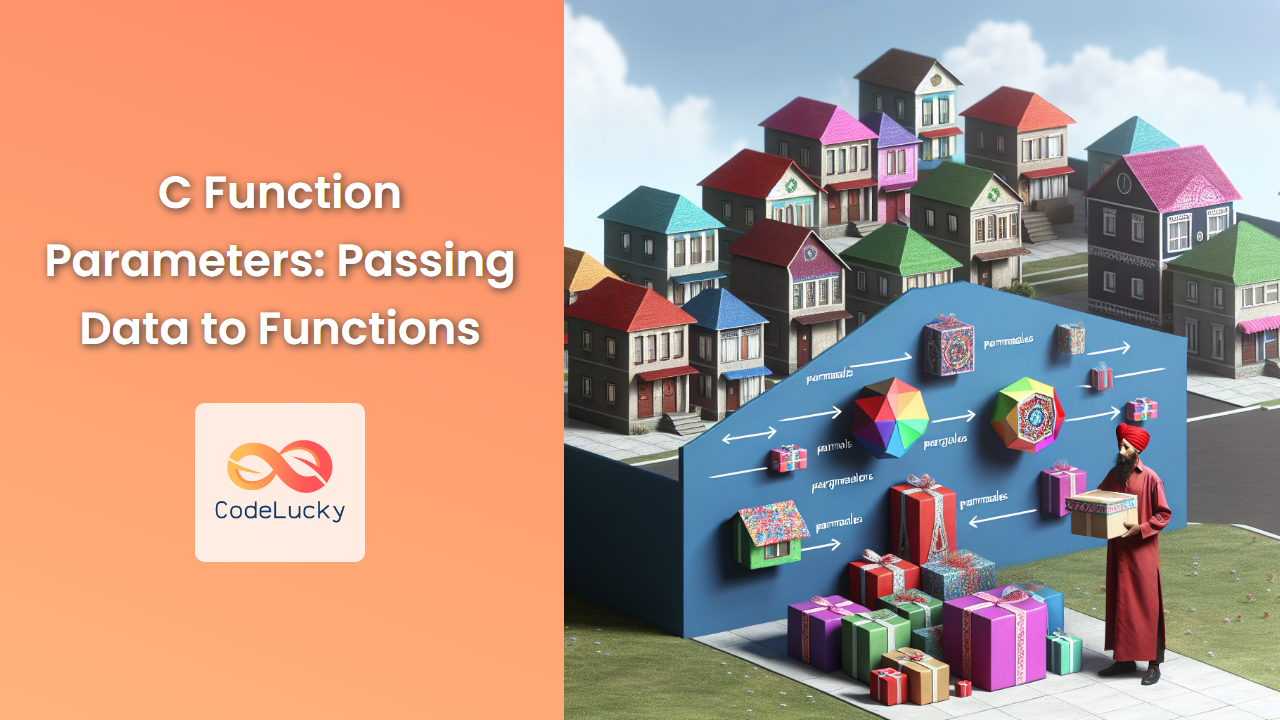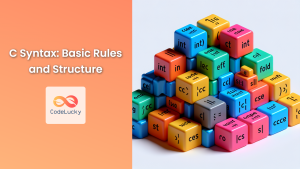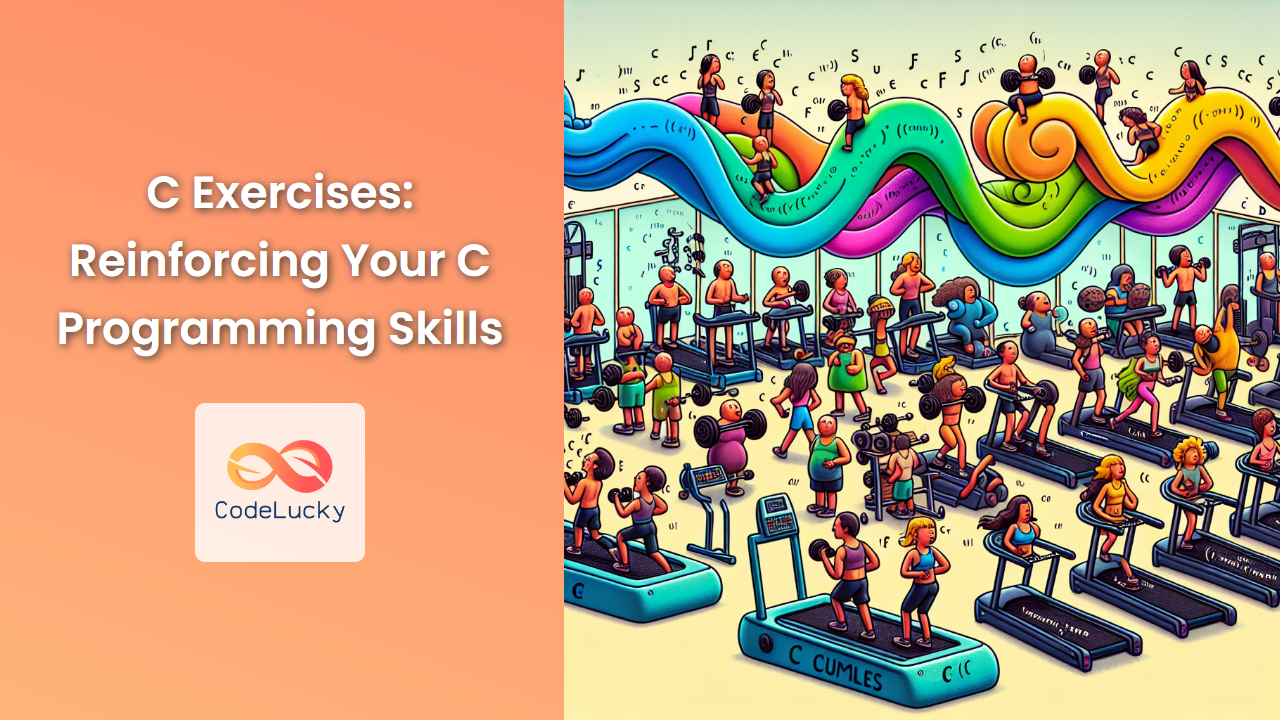In the world of C programming, functions are the building blocks that allow us to create modular and reusable code. One of the most powerful features of functions is their ability to accept parameters, enabling us to pass data into them for processing. This article will dive deep into the concept of function parameters in C, exploring various methods of passing data and their implications.
Understanding Function Parameters
Function parameters are variables that are defined in the function declaration and used to receive values when the function is called. They act as a bridge, allowing data to flow from the calling part of the program into the function.
Let's start with a simple example:
#include <stdio.h>
void greet(char name[]) {
printf("Hello, %s!\n", name);
}
int main() {
greet("Alice");
greet("Bob");
return 0;
}
In this example, name is a parameter of the greet function. When we call greet("Alice"), the string "Alice" is passed as an argument and becomes the value of name inside the function.
🔍 Key Point: Parameters are defined in the function declaration, while arguments are the actual values passed when calling the function.
Types of Parameter Passing in C
C supports two main types of parameter passing: pass by value and pass by reference. Understanding these concepts is crucial for effective C programming.
1. Pass by Value
In pass by value, a copy of the argument's value is passed to the function. Any changes made to the parameter inside the function do not affect the original variable in the calling function.
Let's see an example:
#include <stdio.h>
void increment(int x) {
x++;
printf("Inside function: x = %d\n", x);
}
int main() {
int num = 5;
printf("Before function call: num = %d\n", num);
increment(num);
printf("After function call: num = %d\n", num);
return 0;
}
Output:
Before function call: num = 5
Inside function: x = 6
After function call: num = 5
As we can see, the value of num in main() remains unchanged despite being incremented inside the increment() function.
💡 Tip: Pass by value is useful when you want to protect the original data from being modified by the function.
2. Pass by Reference
In pass by reference, the memory address of the variable is passed to the function. This allows the function to directly access and modify the original variable.
In C, we achieve this by passing pointers. Let's modify our previous example:
#include <stdio.h>
void increment(int *x) {
(*x)++;
printf("Inside function: *x = %d\n", *x);
}
int main() {
int num = 5;
printf("Before function call: num = %d\n", num);
increment(&num);
printf("After function call: num = %d\n", num);
return 0;
}
Output:
Before function call: num = 5
Inside function: *x = 6
After function call: num = 6
Now, the value of num in main() is actually changed by the increment() function.
🔒 Security Note: While powerful, pass by reference should be used carefully as it allows functions to modify variables outside their scope.
Arrays as Function Parameters
When passing arrays to functions in C, it's important to understand that arrays are always passed by reference. This means the function receives a pointer to the first element of the array.
Let's look at an example that calculates the sum of elements in an array:
#include <stdio.h>
int sum_array(int arr[], int size) {
int sum = 0;
for (int i = 0; i < size; i++) {
sum += arr[i];
}
return sum;
}
int main() {
int numbers[] = {1, 2, 3, 4, 5};
int size = sizeof(numbers) / sizeof(numbers[0]);
int total = sum_array(numbers, size);
printf("Sum of array elements: %d\n", total);
return 0;
}
Output:
Sum of array elements: 15
🎓 Learning Point: When passing an array to a function, you typically need to pass its size as well, since this information is lost when the array decays to a pointer.
Structures as Function Parameters
Structures can be passed to functions either by value or by reference. Let's explore both approaches:
Passing Structures by Value
#include <stdio.h>
struct Point {
int x;
int y;
};
void print_point(struct Point p) {
printf("Point: (%d, %d)\n", p.x, p.y);
}
int main() {
struct Point p1 = {10, 20};
print_point(p1);
return 0;
}
Output:
Point: (10, 20)
Passing Structures by Reference
#include <stdio.h>
struct Point {
int x;
int y;
};
void move_point(struct Point *p, int dx, int dy) {
p->x += dx;
p->y += dy;
}
int main() {
struct Point p1 = {10, 20};
printf("Before move: (%d, %d)\n", p1.x, p1.y);
move_point(&p1, 5, -3);
printf("After move: (%d, %d)\n", p1.x, p1.y);
return 0;
}
Output:
Before move: (10, 20)
After move: (15, 17)
🚀 Performance Tip: Passing large structures by reference can be more efficient as it avoids copying the entire structure.
Variable-Length Argument Lists
C allows functions to accept a variable number of arguments using the <stdarg.h> header. This is particularly useful when you don't know in advance how many arguments a function will receive.
Here's an example of a function that calculates the average of a variable number of integers:
#include <stdio.h>
#include <stdarg.h>
double average(int count, ...) {
va_list args;
va_start(args, count);
double sum = 0;
for (int i = 0; i < count; i++) {
sum += va_arg(args, int);
}
va_end(args);
return sum / count;
}
int main() {
printf("Average of 2, 4, 6: %.2f\n", average(3, 2, 4, 6));
printf("Average of 1, 3, 5, 7, 9: %.2f\n", average(5, 1, 3, 5, 7, 9));
return 0;
}
Output:
Average of 2, 4, 6: 4.00
Average of 1, 3, 5, 7, 9: 5.00
⚠️ Warning: While powerful, variable-length argument lists can be error-prone if not used carefully. Always ensure you have a way to determine the number of arguments passed.
Function Pointers as Parameters
C allows you to pass functions as arguments to other functions using function pointers. This is a powerful feature that enables callback mechanisms and enhances code flexibility.
Here's an example that uses a function pointer to apply different operations on an array:
#include <stdio.h>
int add_one(int x) { return x + 1; }
int multiply_by_two(int x) { return x * 2; }
void transform_array(int arr[], int size, int (*transform)(int)) {
for (int i = 0; i < size; i++) {
arr[i] = transform(arr[i]);
}
}
void print_array(int arr[], int size) {
for (int i = 0; i < size; i++) {
printf("%d ", arr[i]);
}
printf("\n");
}
int main() {
int numbers[] = {1, 2, 3, 4, 5};
int size = sizeof(numbers) / sizeof(numbers[0]);
printf("Original array: ");
print_array(numbers, size);
transform_array(numbers, size, add_one);
printf("After adding one: ");
print_array(numbers, size);
transform_array(numbers, size, multiply_by_two);
printf("After multiplying by two: ");
print_array(numbers, size);
return 0;
}
Output:
Original array: 1 2 3 4 5
After adding one: 2 3 4 5 6
After multiplying by two: 4 6 8 10 12
🧠 Advanced Concept: Function pointers allow for powerful abstractions and are the basis for many advanced programming techniques in C.
Best Practices for Function Parameters
-
Use const for Read-Only Parameters: When a parameter should not be modified by the function, use the
constkeyword.void print_string(const char *str) { printf("%s\n", str); } -
Validate Input Parameters: Always check if the input parameters are valid before using them.
int divide(int a, int b) { if (b == 0) { fprintf(stderr, "Error: Division by zero\n"); return 0; } return a / b; } -
Use Appropriate Parameter Types: Choose the most appropriate type for your parameters. For example, use
size_tfor sizes and array indices. -
Document Function Parameters: Use comments to clearly describe what each parameter does and any constraints on its values.
/** * Calculates the area of a rectangle. * @param width The width of the rectangle (must be positive). * @param height The height of the rectangle (must be positive). * @return The area of the rectangle. */ double rectangle_area(double width, double height) { return width * height; } -
Limit the Number of Parameters: If a function requires many parameters, consider grouping related parameters into a structure.
Conclusion
Understanding function parameters is crucial for writing effective C programs. We've explored various aspects of parameter passing, including pass by value, pass by reference, arrays, structures, variable-length argument lists, and function pointers as parameters. Each method has its use cases, advantages, and potential pitfalls.
By mastering these concepts, you'll be able to write more flexible, efficient, and maintainable C code. Remember to always consider the implications of your parameter passing choices, especially in terms of performance and data integrity.
Keep practicing with different parameter passing techniques, and you'll soon find yourself writing more sophisticated and powerful C programs. Happy coding! 🖥️💻🚀


















